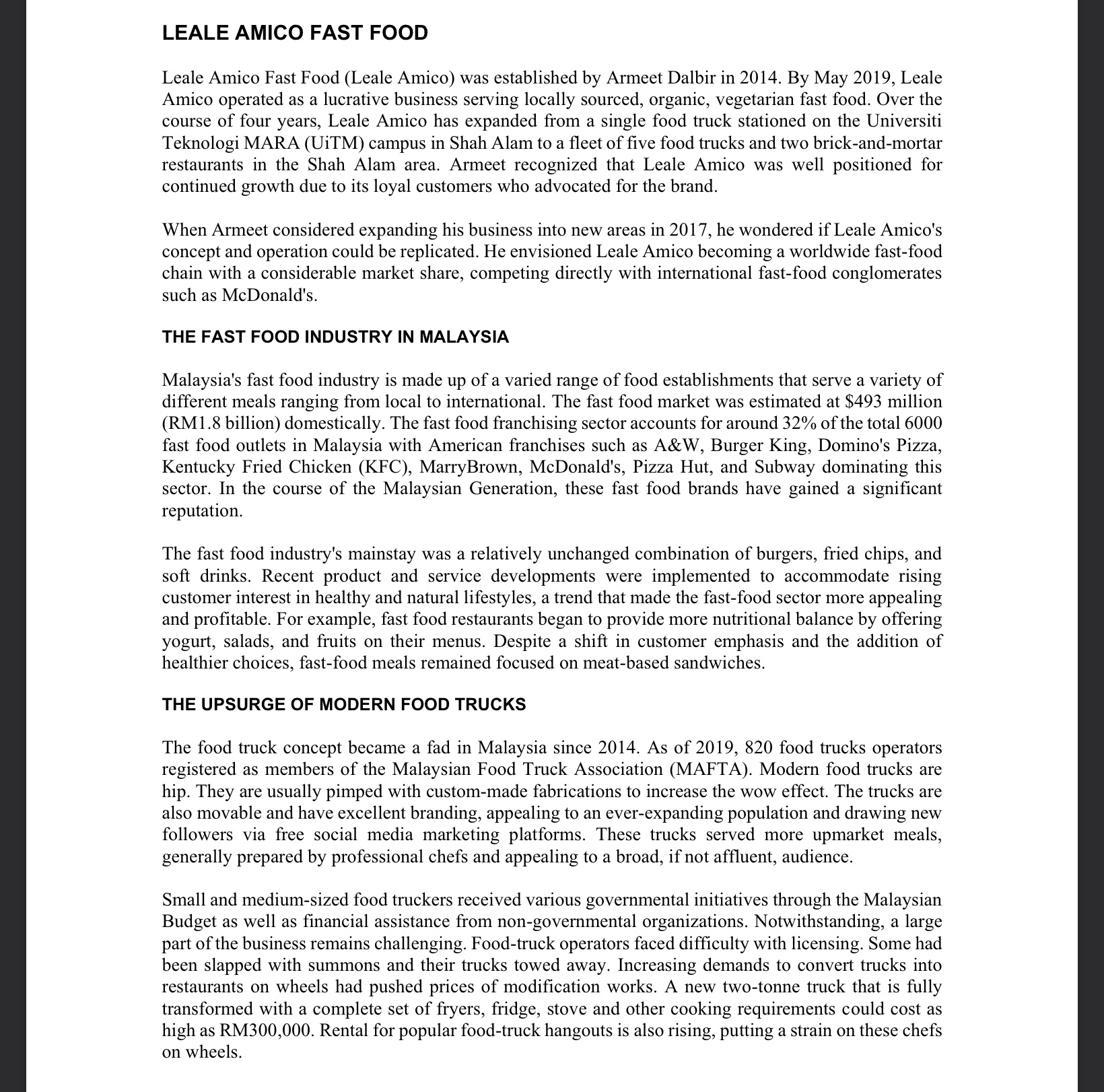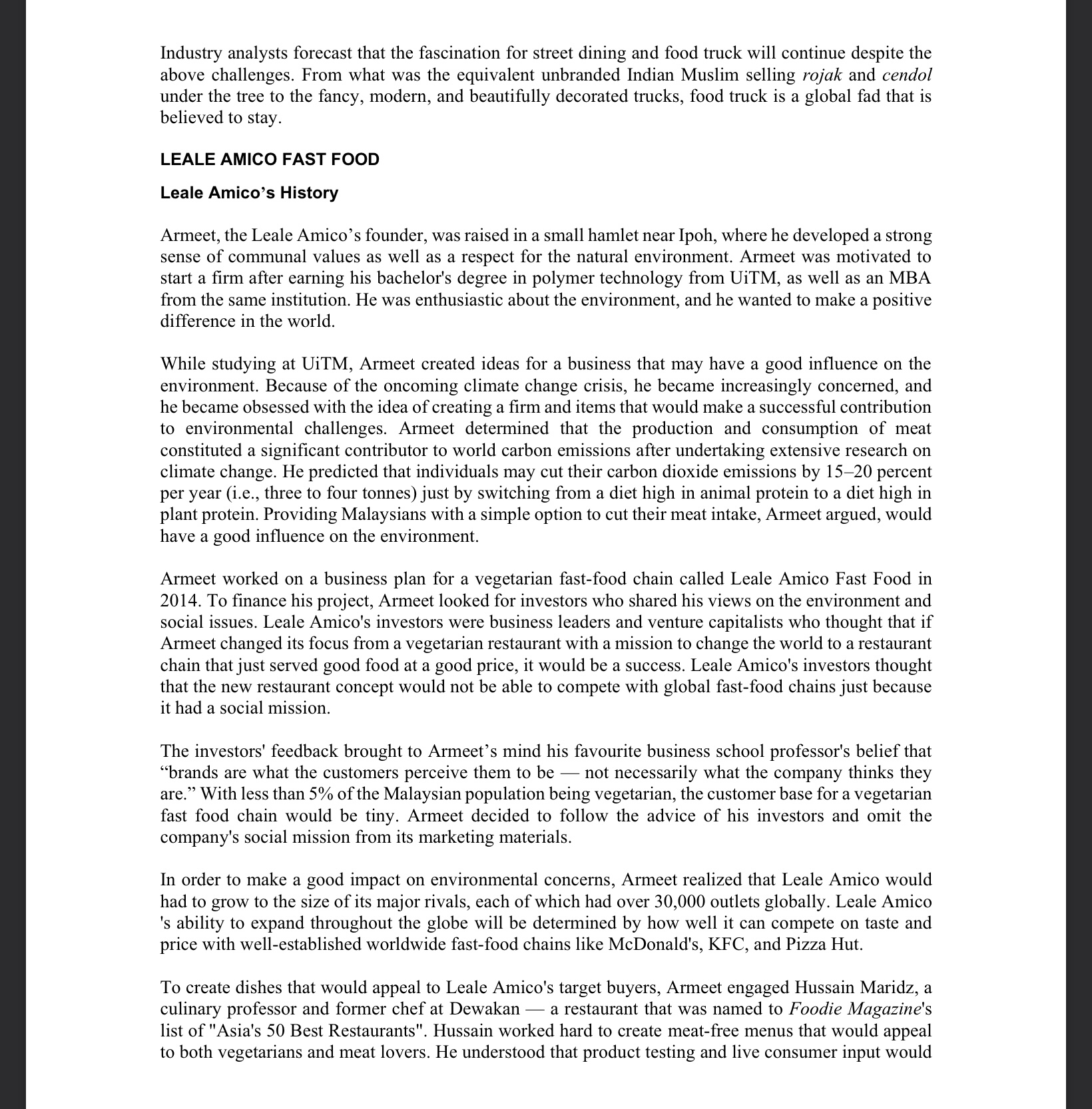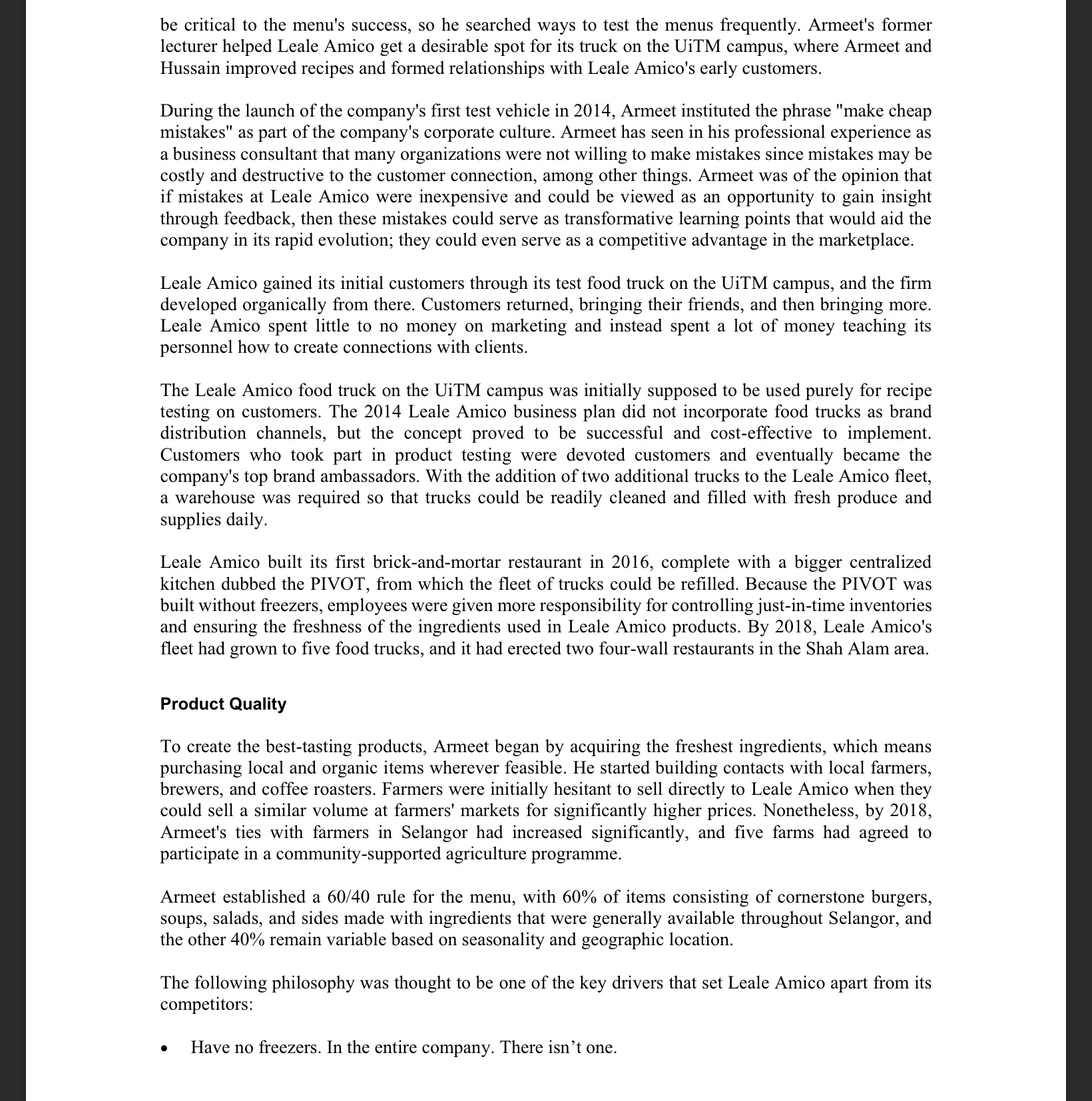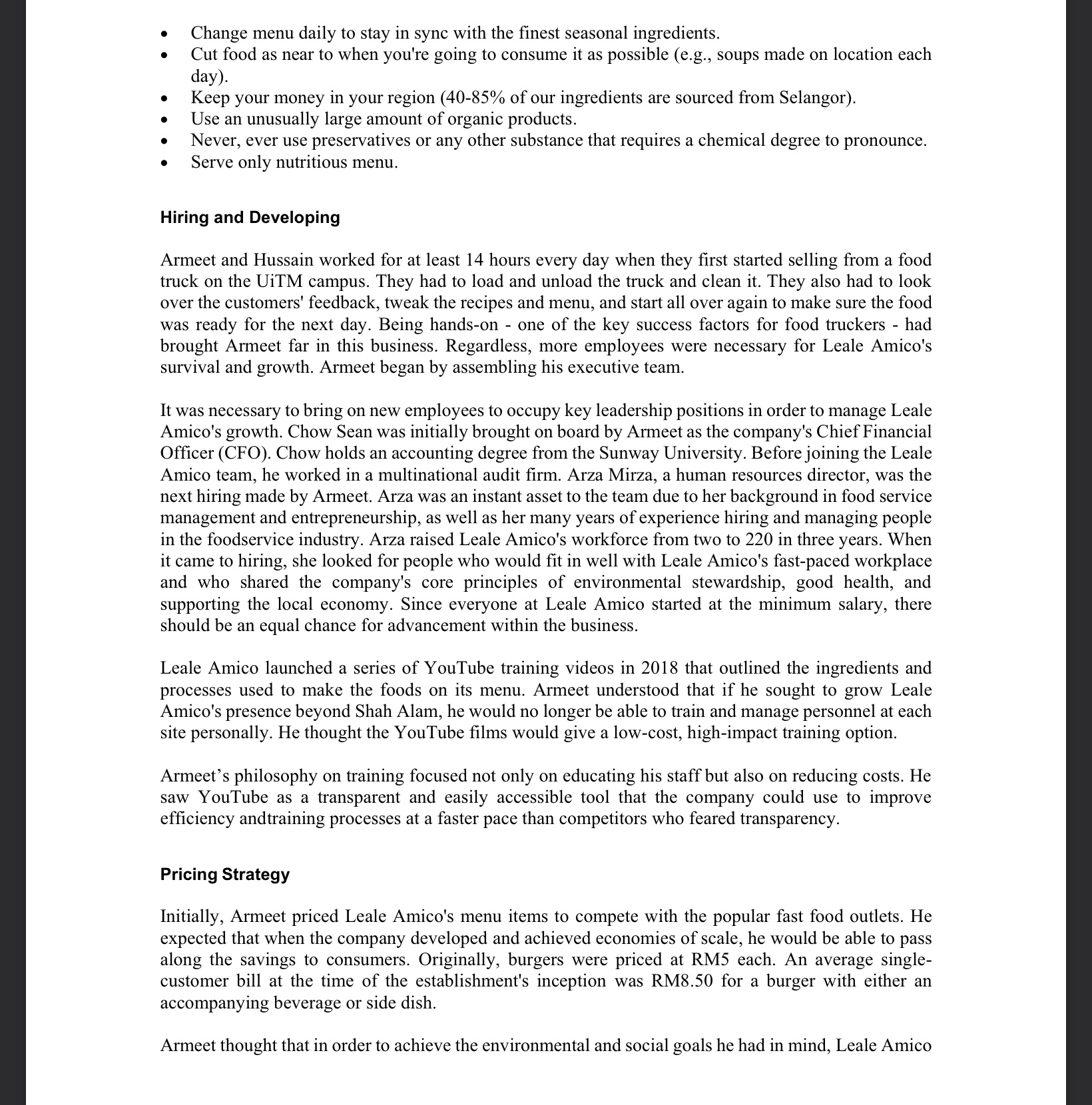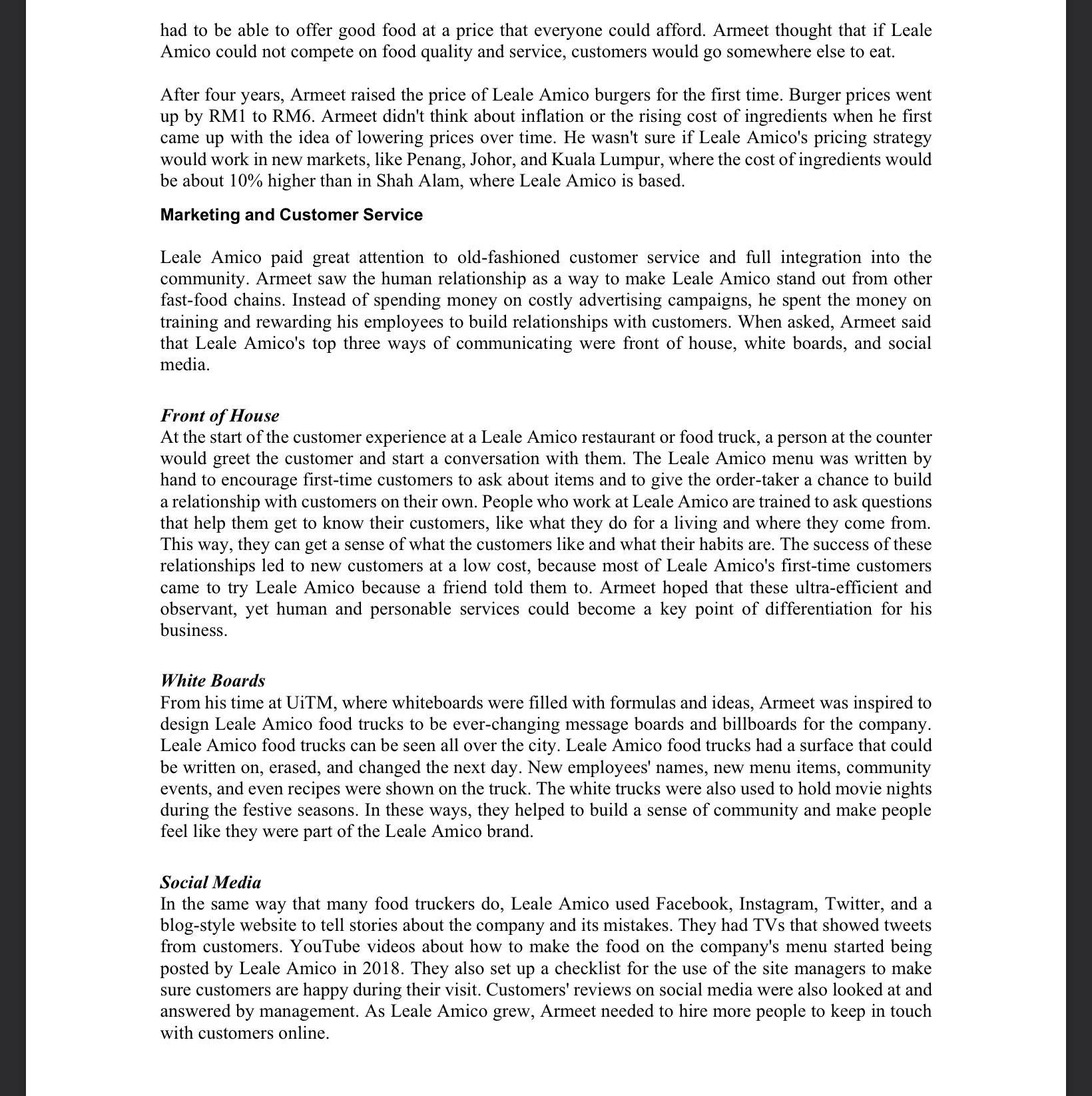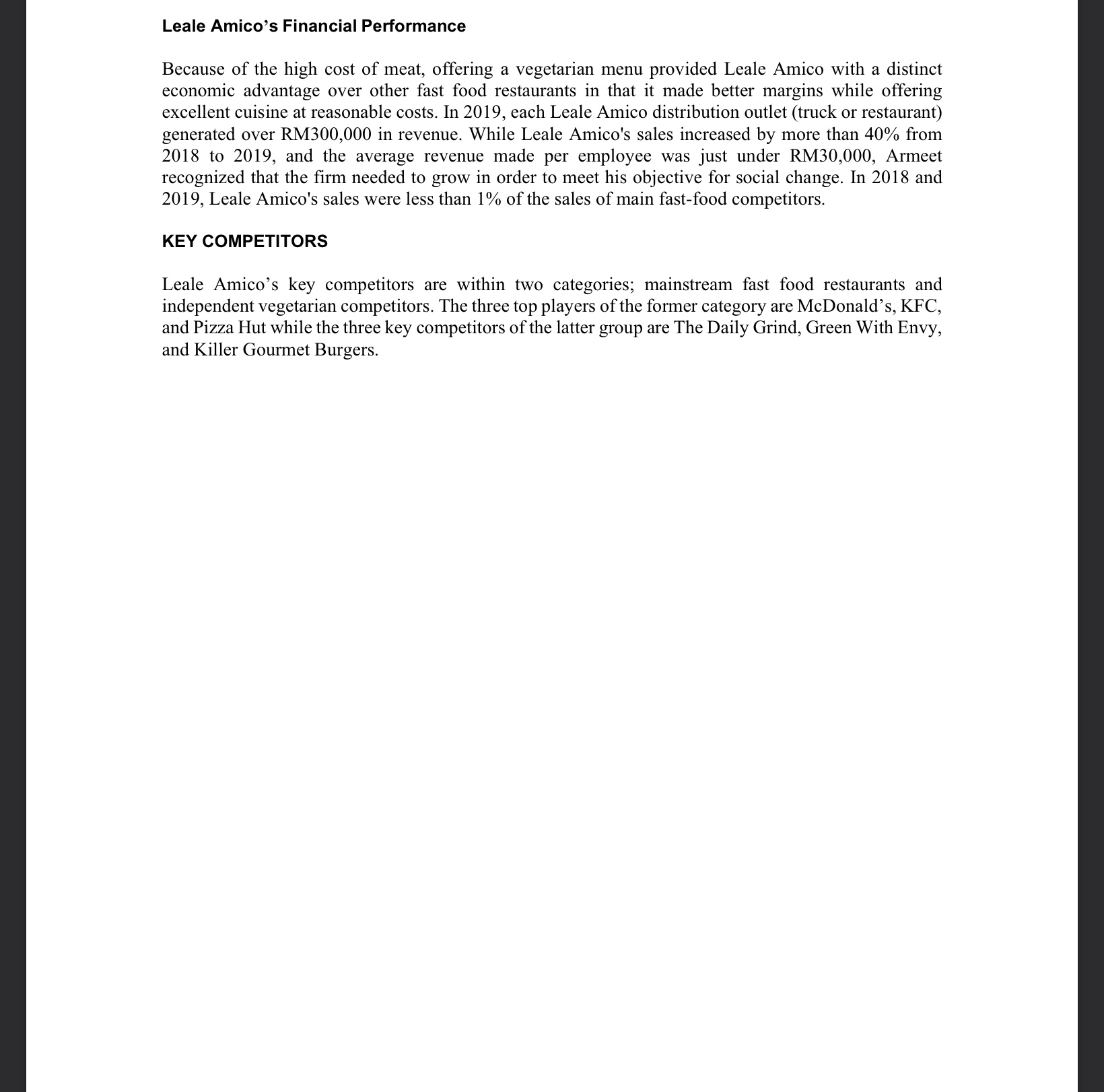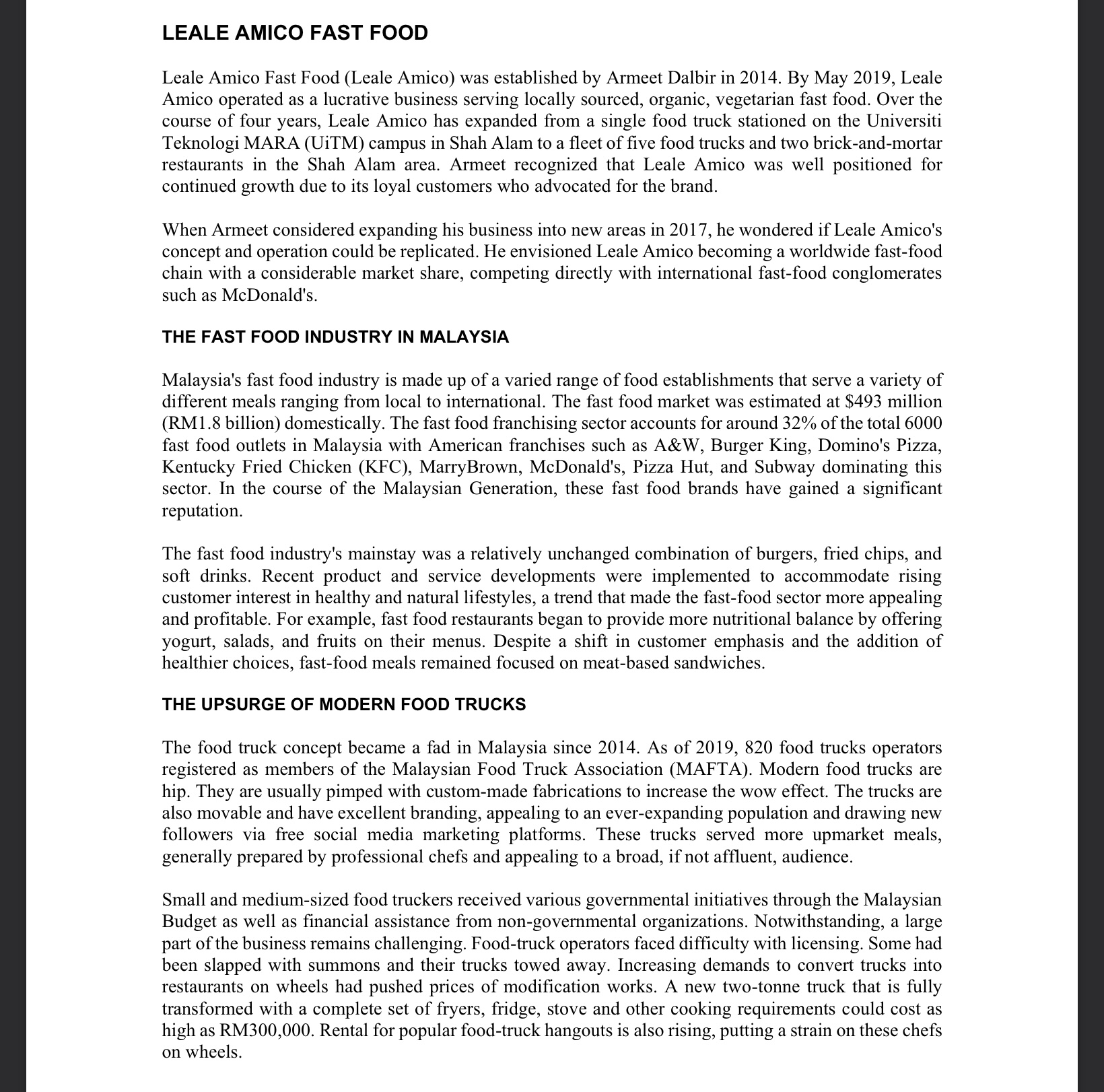
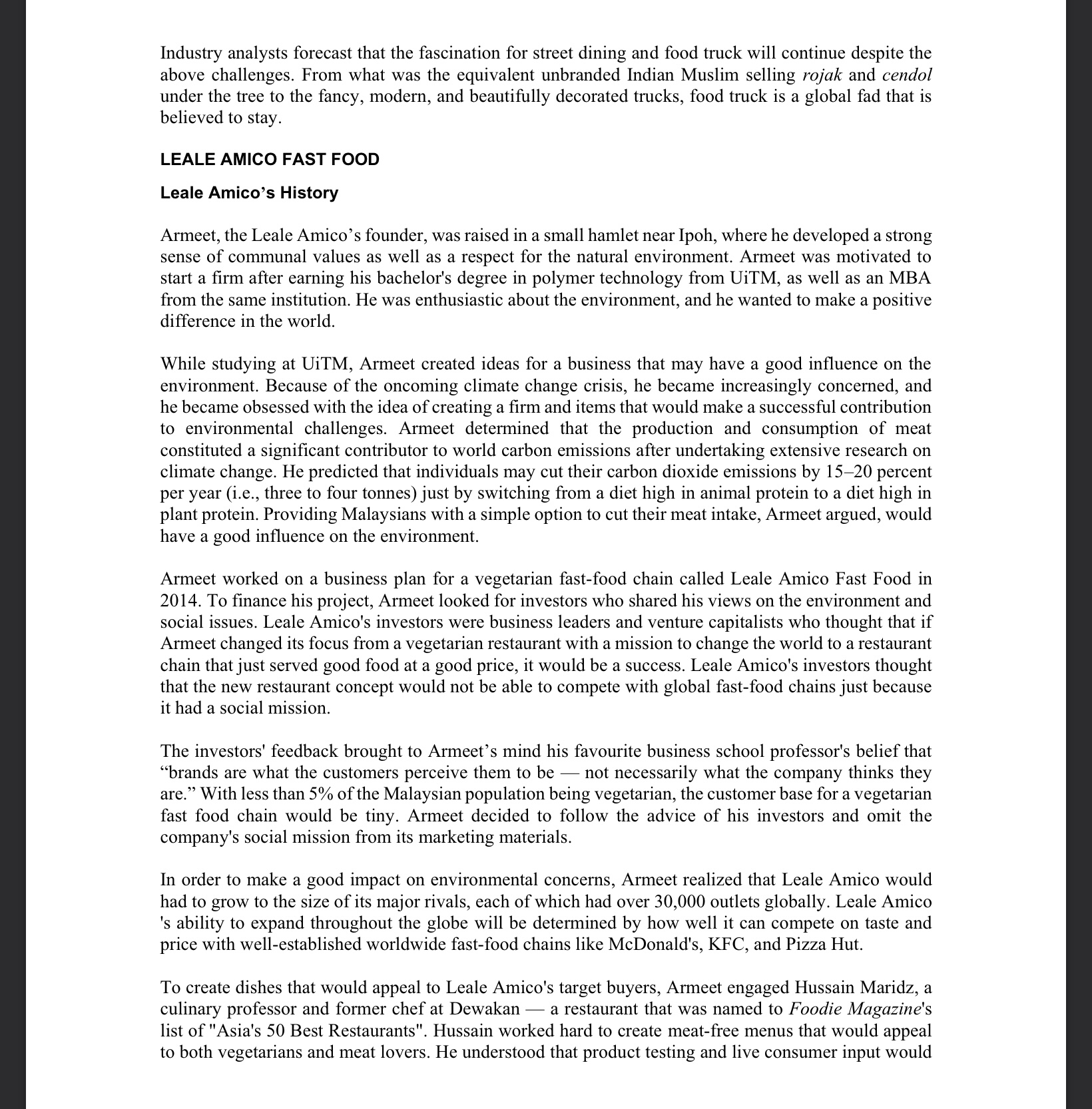
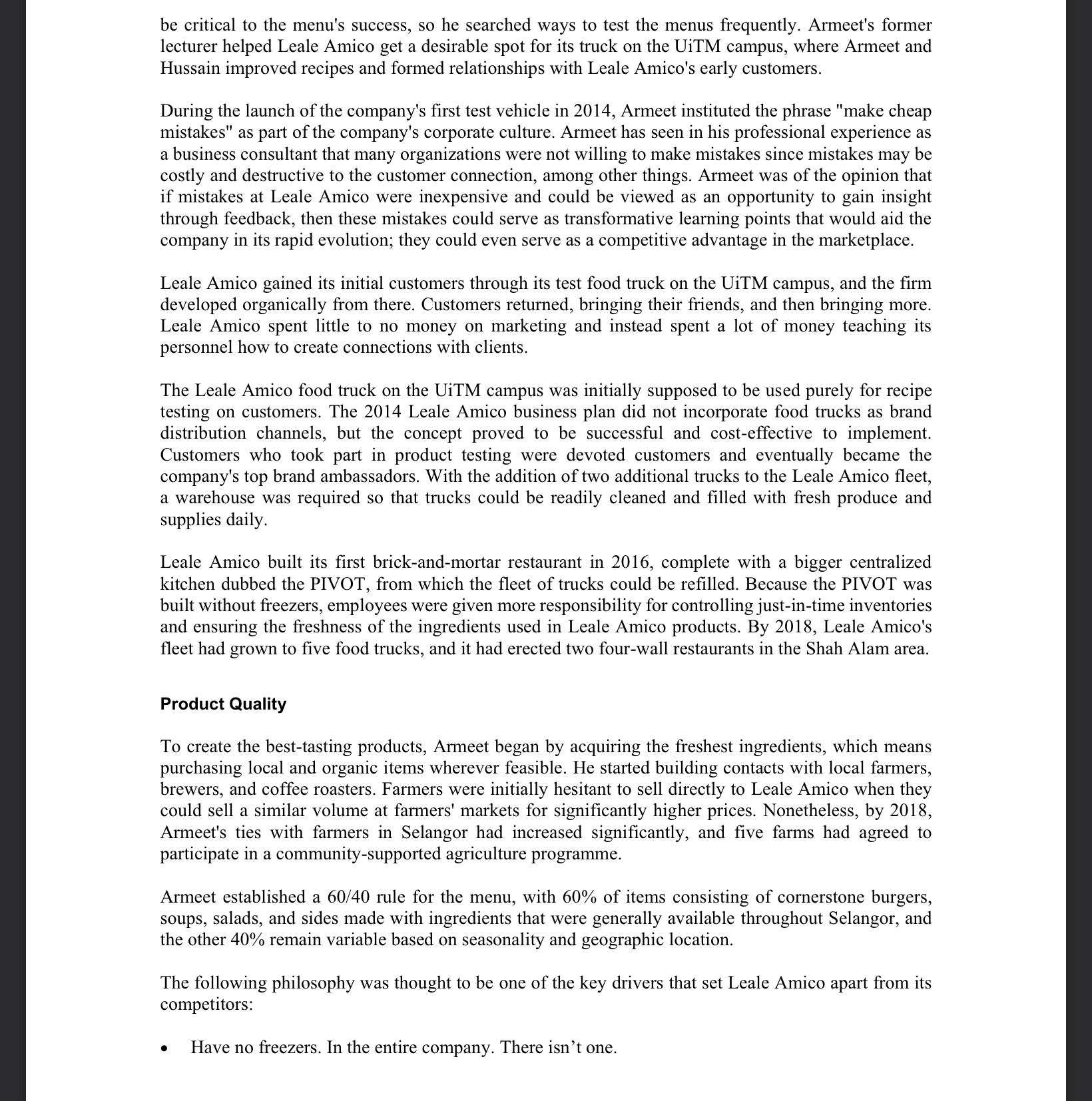
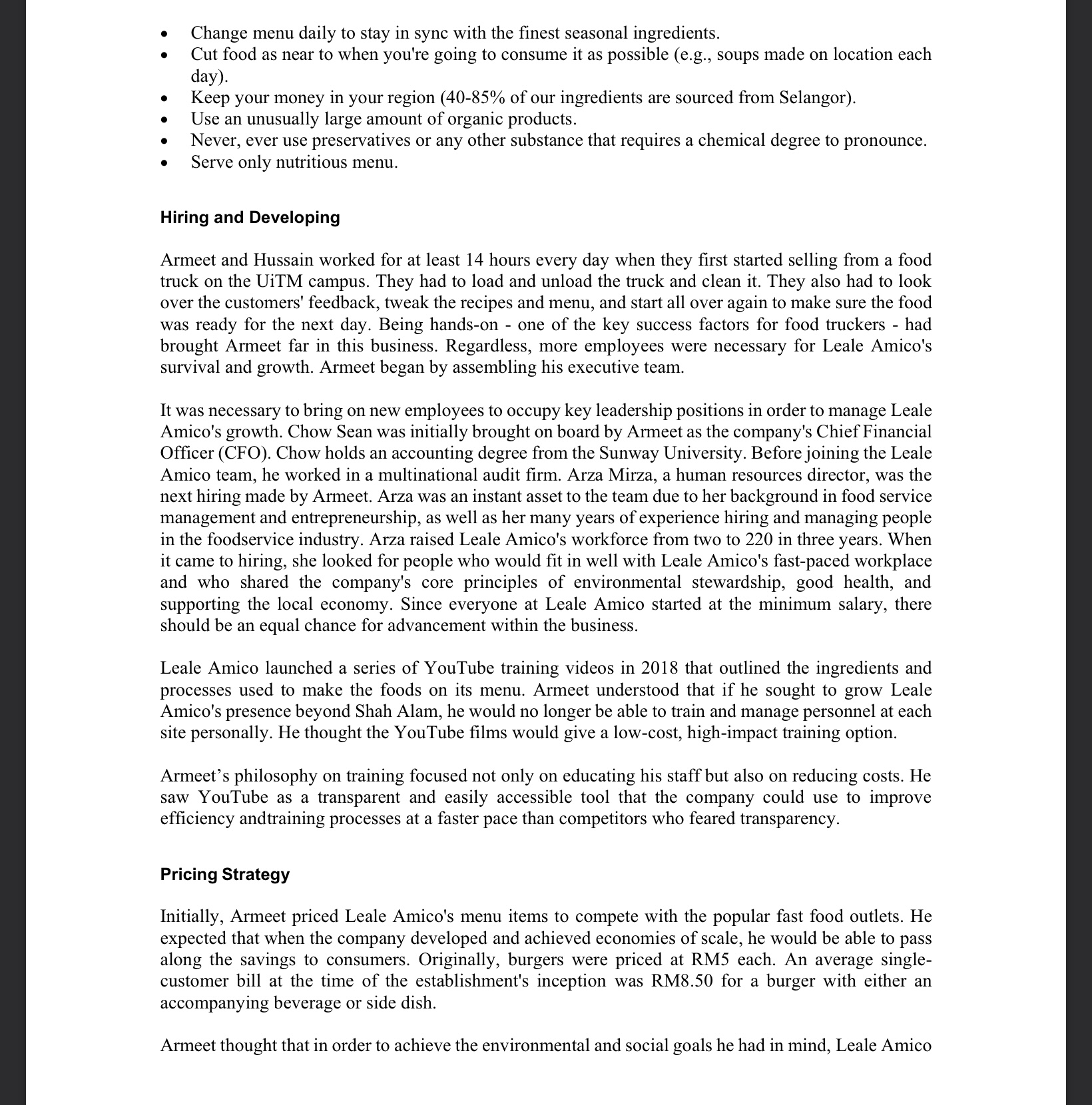
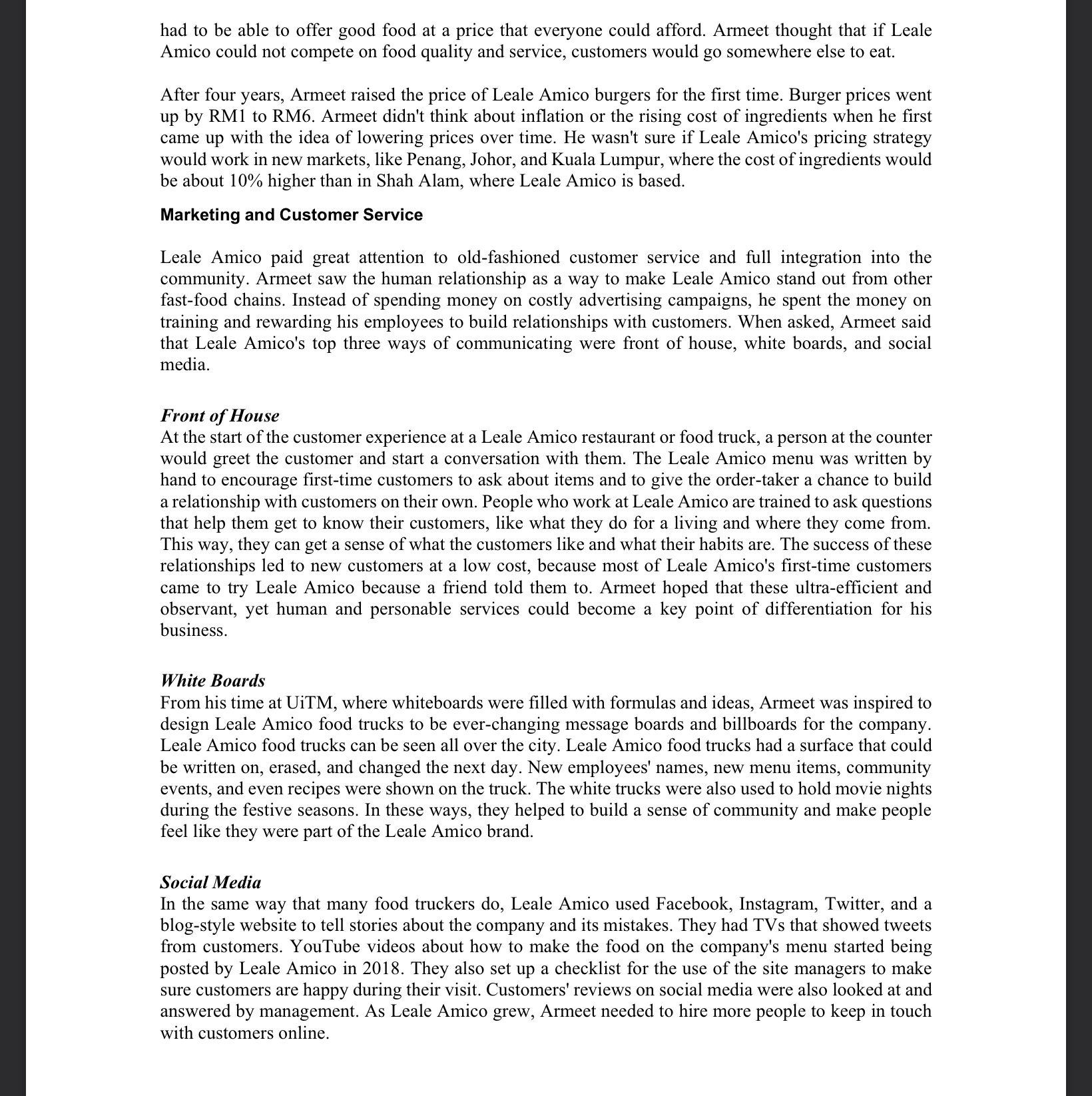
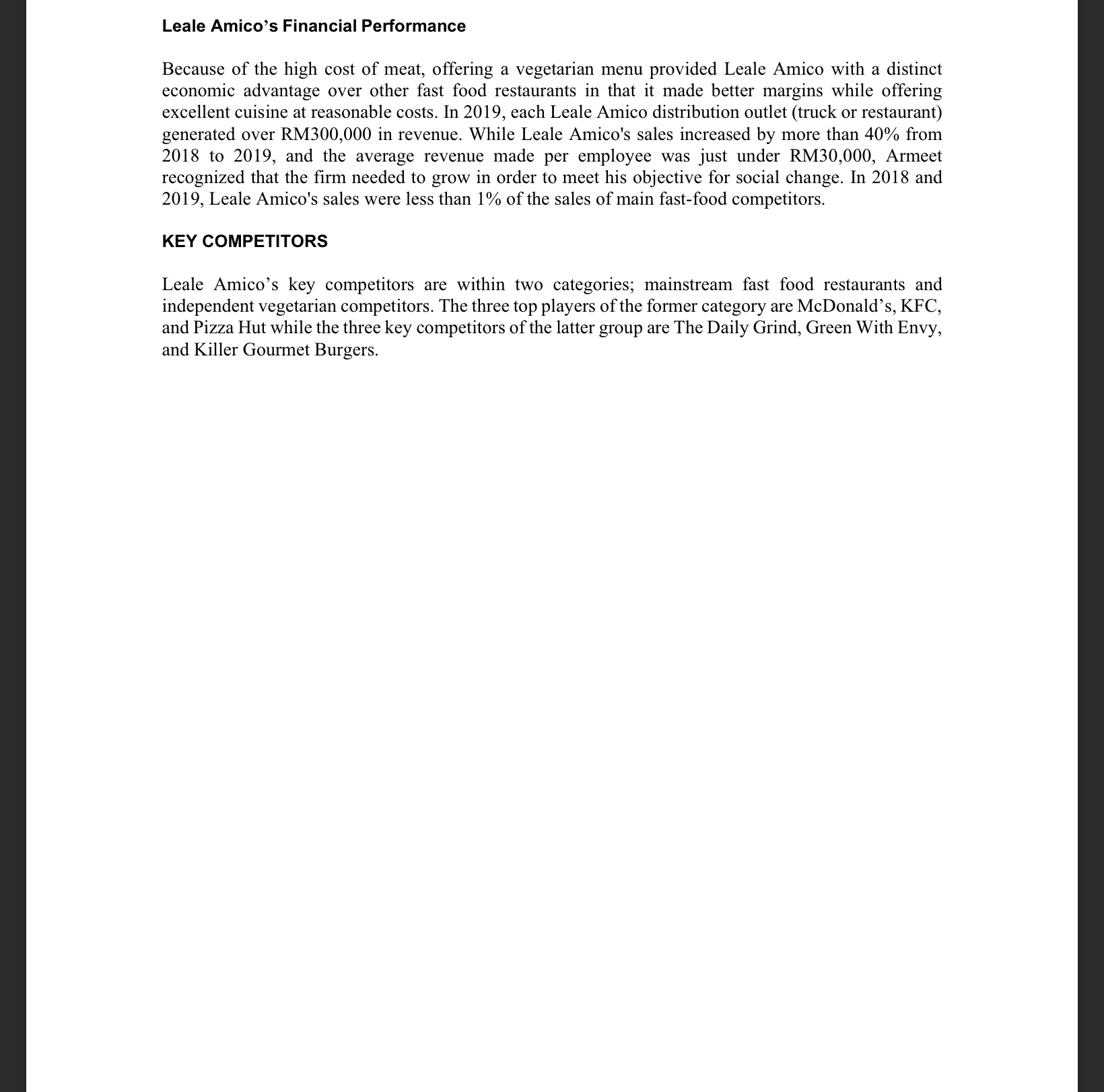
What are the issues in this case study and the solutions for each issue.
LEALE AMICO FAST FOOD Leale Amico Fast Food (Leale Amico) was established by Armeet Dalbir in 2014. By May 2019, Leale Amico operated as a lucrative business serving locally sourced, organic, vegetarian fast food. Over the course of four years, Leale Amico has expanded from a single food truck stationed on the Universiti Teknologi MARA (UITM) campus in Shah Alam to a fleet of five food trucks and two brick-and-mortar restaurants in the Shah Alam area. Armeet recognized that Leale Amico was well positioned for continued growth due to its loyal customers who advocated for the brand When Armeet considered expanding his business into new areas in 2017, he wondered if Leale Amico's concept and operation could be replicated. He envisioned Leale Amico becoming a worldwide fast-food chain with a considerable market share, competing directly with international fast-food conglomerates such as Mcdonald's. THE FAST FOOD INDUSTRY IN MALAYSIA Malaysia's fast food industry is made up of a varied range of food establishments that serve a variety of different meals ranging from local to international. The fast food market was estimated at $493 million (RM1.8 billion) domestically. The fast food franchising sector accounts for around 32% of the total 6000 fast food outlets in Malaysia with American franchises such as A& W, Burger King, Domino's Pizza, Kentucky Fried Chicken (KFC), MarryBrown, Mcdonald's, Pizza Hut, and Subway dominating this sector. In the course of the Malaysian Generation, these fast food brands have gained a significant reputation. The fast food industry's mainstay was a relatively unchanged combination of burgers, fried chips, and soft drinks. Recent product and service developments were implemented to accommodate rising customer interest in healthy and natural lifestyles, a trend that made the fast-food sector more appealing and profitable. For example, fast food restaurants began to provide more nutritional balance by offering yogurt, salads, and fruits on their menus. Despite a shift in customer emphasis and the addition of healthier choices, fast-food meals remained focused on meat-based sandwiches. THE UPSURGE OF MODERN FOOD TRUCKS The food truck concept became a fad in Malaysia since 2014. As of 2019, 820 food trucks operators registered as members of the Malaysian Food Truck Association (MAFTA). Modern food trucks are hip. They are usually pimped with custom-made fabrications to increase the wow effect. The trucks are also movable and have excellent branding, appealing to an ever-expanding population and drawing new followers via free social media marketing platforms. These trucks served more upmarket meals, generally prepared by professional chefs and appealing to a broad, if not affluent, audience. Small and medium-sized food truckers received various governmental initiatives through the Malaysian Budget as well as financial assistance from non-governmental organizations. Notwithstanding, a large part of the business remains challenging. Food-truck operators faced difficulty with licensing. Some had been slapped with summons and their trucks towed away. Increasing demands to convert trucks into restaurants on wheels had pushed prices of modification works. A new two-tonne truck that is fully transformed with a complete set of fryers, fridge, stove and other cooking requirements could cost as high as RM300,000. Rental for popular food-truck hangouts is also rising, putting a strain on these chefs on wheels.Industry analysts forecast that the fascination for street dining and food truck will continue despite the above challenges. From what was the equivalent unbranded Indian Muslim selling rojak and cendol under the tree to the fancy, modern, and beautifully decorated trucks, food truck is a global fad that is believed to stay. LEALE AMICO FAST FOOD Leale Amico's History Armeet, the Leale Amico's founder, was raised in a small hamlet near Ipoh, where he developed a strong sense of communal values as well as a respect for the natural environment. Armeet was motivated to start a rm after earning his bachelor's degree in polymer technology from UiTM, as well as an MBA from the same institution. He was enthusiastic about the environment, and he wanted to make a positive difference in the world. While studying at UiTM, Armeet created ideas for a business that may have a good influence on the environment. Because of the oncoming climate change crisis, he became increasingly concerned, and he became obsessed with the idea of creating a rm and items that would make a successful contribution to environmental challenges. Armeet determined that the production and consumption of meat constituted a signicant contributor to world carbon emissions after undertaking extensive research on climate change. He predicted that individuals may cut their carbon dioxide emissions by 1520 percent per year (i.e., three to four tonnes) just by switching from a diet high in animal protein to a diet high in plant protein. Providing Malaysians with a simple option to cut their meat intake, Armeet argued, would have a good inuence on the environment. Armeet worked on a business plan for a vegetarian fast-food chain called Leale Amico Fast Food in 2014. To nance his project, Armeet looked for investors who shared his views on the environment and social issues. Leale Amico's investors were business leaders and venture capitalists who thought that if Armeet changed its focus from a vegetarian restaurant with a mission to change the world to a restaurant chain that just served good food at a good price, it would be a success. Leale Amico's investors thought that the new restaurant concept would not be able to compete with global fast-food chains just because it had a social mission. The investors' feedback brought to Armeet's mind his favourite business school professor's belief that \"brands are what the customers perceive them to be 7 not necessarily what the company thinks they are.\" With less than 5% of the Malaysian population being vegetarian, the customer base for a vegetarian fast food chain would be tiny. Armeet decided to follow the advice of his investors and omit the company's social mission from its marketing materials. In order to make a good impact on environmental concerns, Armeet realized that Leale Amico would had to grow to the size of its major rivals, each of which had over 30,000 outlets globally. Leale Amico 's ability to expand throughout the globe will be determined by how well it can compete on taste and price with well-established worldwide fast-food chains like McDonald's, KFC, and Pizza Hut. To create dishes that would appeal to Leale Amico's target buyers, Armeet engaged Hussain Maridz, a culinary professor and former chef at Dewakan 7 a restaurant that was named to Foodie Magazine's list of "Asia's 50 Best Restaurants". Hussain worked hard to create meat-free menus that would appeal to both vegetarians and meat lovers. He understood that product testing and live consumer input would be critical to the menu's success, so he searched ways to test the menus frequently. Armeet's former lecturer helped Leale Amico get a desirable spot for its truck on the UITM campus, where Armeet and Hussain improved recipes and formed relationships with Leale Amico's early customers. During the launch of the company's first test vehicle in 2014, Armeet instituted the phrase "make cheap mistakes" as part of the company's corporate culture. Armeet has seen in his professional experience as a business consultant that many organizations were not willing to make mistakes since mistakes may be costly and destructive to the customer connection, among other things. Armeet was of the opinion that if mistakes at Leale Amico were inexpensive and could be viewed as an opportunity to gain insight through feedback, then these mistakes could serve as transformative learning points that would aid the company in its rapid evolution; they could even serve as a competitive advantage in the marketplace. Leale Amico gained its initial customers through its test food truck on the UITM campus, and the firm developed organically from there. Customers returned, bringing their friends, and then bringing more. Leale Amico spent little to no money on marketing and instead spent a lot of money teaching its personnel how to create connections with clients. The Leale Amico food truck on the UITM campus was initially supposed to be used purely for recipe testing on customers. The 2014 Leale Amico business plan did not incorporate food trucks as brand distribution channels, but the concept proved to be successful and cost-effective to implement. Customers who took part in product testing were devoted customers and eventually became the company's top brand ambassadors. With the addition of two additional trucks to the Leale Amico fleet, a warehouse was required so that trucks could be readily cleaned and filled with fresh produce and supplies daily. Leale Amico built its first brick-and-mortar restaurant in 2016, complete with a bigger centralized kitchen dubbed the PIVOT, from which the fleet of trucks could be refilled. Because the PIVOT was built without freezers, employees were given more responsibility for controlling just-in-time inventories and ensuring the freshness of the ingredients used in Leale Amico products. By 2018, Leale Amico's fleet had grown to five food trucks, and it had erected two four-wall restaurants in the Shah Alam area. Product Quality To create the best-tasting products, Armeet began by acquiring the freshest ingredients, which means purchasing local and organic items wherever feasible. He started building contacts with local farmers, brewers, and coffee roasters. Farmers were initially hesitant to sell directly to Leale Amico when they could sell a similar volume at farmers' markets for significantly higher prices. Nonetheless, by 2018, Armeet's ties with farmers in Selangor had increased significantly, and five farms had agreed to participate in a community-supported agriculture programme Armeet established a 60/40 rule for the menu, with 60% of items consisting of cornerstone burgers, soups, salads, and sides made with ingredients that were generally available throughout Selangor, and the other 40% remain variable based on seasonality and geographic location. The following philosophy was thought to be one of the key drivers that set Leale Amico apart from its competitors: Have no freezers. In the entire company. There isn't one.a Change menu daily to stay in sync with the nest seasonal ingredients. Cut food as near to when you're going to consume it as possible (e.g., soups made on location each day). Keep your money in your region (40-85% of our ingredients are sourced from Selangor). Use an unusually large amount of organic products. Never, ever use preservatives or any other substance that requires a chemical degree to pronounce. Serve only nutritious menu. Hiring and Developing Armeet and Hussain worked for at least 14 hours every day when they rst started selling from a food truck on the UiTM campus. They had to load and unload the truck and clean it. They also had to look over the customers' feedback, tweak the recipes and menu, and start all over again to make sure the food was ready for the next day. Being hands-on - one of the key success factors for food truckers - had brought Armeet far in this business. Regardless, more employees were necessary for Leale Amico's survival and growth. Armeet began by assembling his executive team. It was necessary to bring on new employees to occupy key leadership positions in order to manage Leale Arnico's growth. Chow Sean was initially brought on board by Armeet as the company's Chief Financial Ofcer (CFO). Chow holds an accounting degree from the Sunway University. Before joining the Leale Amico team, he worked in a multinational audit rm. Arza Mirza, a human resources director, was the next hiring made by Armeet. Arza was an instant asset to the team due to her background in food service management and entrepreneurship, as well as her many years of experience hiring and managing people in the foodservice industry. Arza raised Leale Amico's workforce from two to 220 in three years. When it came to hiring, she looked for people who would t in well with Leale Amico's fast-paced workplace and who shared the company's core principles of environmental stewardship, good health, and supporting the local economy. Since everyone at Leale Amico started at the minimum salary, there should be an equal chance for advancement within the business. Leale Amico launched a series of YouTube training videos in 2018 that outlined the ingredients and processes used to make the foods on its menu. Armeet understood that if he sought to grow Leale Amico's presence beyond Shah Alam, he would no longer be able to train and manage personnel at each site personally. He thought the YouTube lms would give a low-cost, high-impact training option. Armeet's philosophy on training focused not only on educating his staff but also on reducing costs. He saw YouTube as a transparent and easily accessible tool that the company could use to improve efciency andtraining processes at a faster pace than competitors who feared transparency. Pricing Strategy Initially, Armeet priced Leale Amico's menu items to compete with the popular fast food outlets. He expected that when the company developed and achieved economies of scale, he would be able to pass along the savings to consumers. Originally, burgers were priced at RM5 each. An average single- customer bill at the time of the establishment's inception was RM8.50 for a burger with either an accompanying beverage or side dish. Armeet thought that in order to achieve the environmental and social goals he had in mind, Leale Amico had to be able to offer good food at a price that everyone could afford. Armeet thought that if Leale Amico could not compete on food quality and service, customers would go somewhere else to eat. After four years, Armeet raised the price of Leale Amico burgers for the first time. Burger prices went up by RM1 to RM6. Armeet didn't think about inflation or the rising cost of ingredients when he first came up with the idea of lowering prices over time. He wasn't sure if Leale Amico's pricing strategy would work in new markets, like Penang, Johor, and Kuala Lumpur, where the cost of ingredients would be about 10% higher than in Shah Alam, where Leale Amico is based. Marketing and Customer Service Leale Amico paid great attention to old-fashioned customer service and full integration into the community. Armeet saw the human relationship as a way to make Leale Amico stand out from other fast-food chains. Instead of spending money on costly advertising campaigns, he spent the money on training and rewarding his employees to build relationships with customers. When asked, Armeet said that Leale Amico's top three ways of communicating were front of house, white boards, and social media. Front of House At the start of the customer experience at a Leale Amico restaurant or food truck, a person at the counter would greet the customer and start a conversation with them. The Leale Amico menu was written by hand to encourage first-time customers to ask about items and to give the order-taker a chance to build a relationship with customers on their own. People who work at Leale Amico are trained to ask questions that help them get to know their customers, like what they do for a living and where they come from. This way, they can get a sense of what the customers like and what their habits are. The success of these relationships led to new customers at a low cost, because most of Leale Amico's first-time customers came to try Leale Amico because a friend told them to. Armeet hoped that these ultra-efficient and observant, yet human and personable services could become a key point of differentiation for his business. White Boards From his time at UiTM, where whiteboards were filled with formulas and ideas, Armeet was inspired to design Leale Amico food trucks to be ever-changing message boards and billboards for the company. Leale Amico food trucks can be seen all over the city. Leale Amico food trucks had a surface that could be written on, erased, and changed the next day. New employees' names, new menu items, community events, and even recipes were shown on the truck. The white trucks were also used to hold movie nights during the festive seasons. In these ways, they helped to build a sense of community and make people feel like they were part of the Leale Amico brand. Social Media In the same way that many food truckers do, Leale Amico used Facebook, Instagram, Twitter, and a blog-style website to tell stories about the company and its mistakes. They had TVs that showed tweets from customers. YouTube videos about how to make the food on the company's menu started being posted by Leale Amico in 2018. They also set up a checklist for the use of the site managers to make sure customers are happy during their visit. Customers' reviews on social media were also looked at and answered by management. As Leale Amico grew, Armeet needed to hire more people to keep in touch with customers online.Leale Amico's Financial Performance Because of the high cost of meat, offering a vegetarian menu provided Leale Amico with a distinct economic advantage over other fast food restaurants in that it made better margins while offering excellent cuisine at reasonable costs. In 2019, each Leale Amico distribution outlet (truck or restaurant) generated over RM300,000 in revenue. While Leale Amico's sales increased by more than 40% from 2018 to 2019, and the average revenue made per employee was just under RM30,000, Armeet recognized that the rm needed to grow in order to meet his objective for social change. In 2018 and 2019, Leale Amico's sales were less than 1% of the sales of main fast-food competitors. KEY COMPETITORS Leale Amico's key competitors are within two categories; mainstream fast food restaurants and independent vegetarian competitors. The three top players of the former category are McDonald's, KFC, and Pizza Hut while the three key competitors of the latter group are The Daily Grind, Green With Envy, and Killer Gourmet Burgers






